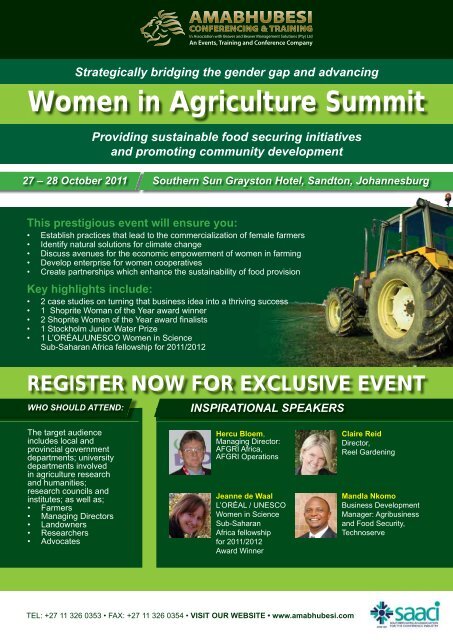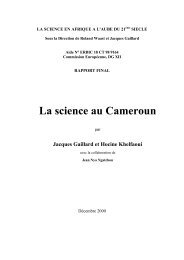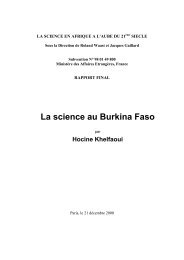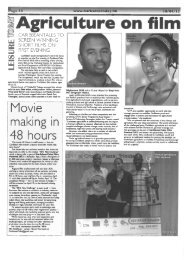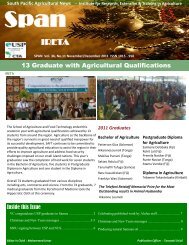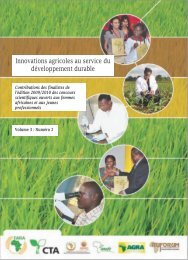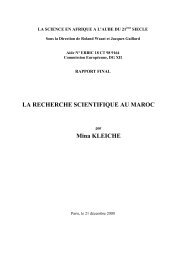Download PDF - Knowledge for development
Download PDF - Knowledge for development
Download PDF - Knowledge for development
You also want an ePaper? Increase the reach of your titles
YUMPU automatically turns print PDFs into web optimized ePapers that Google loves.
Strategically bridging the gender gap and advancing<br />
Women in Agriculture Summit<br />
Providing sustainable food securing initiatives<br />
and promoting community <strong>development</strong><br />
27 – 28 October 2011 Southern Sun Grayston Hotel, Sandton, Johannesburg<br />
This prestigious event will ensure you:<br />
• Establish practices that lead to the commercialization of female farmers<br />
• Identify natural solutions <strong>for</strong> climate change<br />
• Discuss avenues <strong>for</strong> the economic empowerment of women in farming<br />
• Develop enterprise <strong>for</strong> women cooperatives<br />
• Create partnerships which enhance the sustainability of food provision<br />
Key highlights include:<br />
• 2 case studies on turning that business idea into a thriving success<br />
• 1 Shoprite Woman of the Year award winner<br />
• 2 Shoprite Women of the Year award fi nalists<br />
• 1 Stockholm Junior Water Prize<br />
• 1 L’ORÉAL/UNESCO Women in Science<br />
Sub-Saharan Africa fellowship <strong>for</strong> 2011/2012<br />
REGISTER NOW FOR EXCLUSIVE EVENT<br />
WHO SHOULD ATTEND:<br />
INSPIRATIONAL SPEAKERS<br />
The target audience<br />
includes local and<br />
provincial government<br />
departments; university<br />
departments involved<br />
in agriculture research<br />
and humanities;<br />
research councils and<br />
institutes; as well as;<br />
• Farmers<br />
• Managing Directors<br />
• Landowners<br />
• Researchers<br />
• Advocates<br />
Hercu Bloem,<br />
Managing Director:<br />
AFGRI Africa,<br />
AFGRI Operations<br />
Jeanne de Waal<br />
L’ORÉAL / UNESCO<br />
Women in Science<br />
Sub-Saharan<br />
Africa fellowship<br />
<strong>for</strong> 2011/2012<br />
Award Winner<br />
Claire Reid<br />
Director,<br />
Reel Gardening<br />
Mandla Nkomo<br />
Business Development<br />
Manager: Agribusiness<br />
and Food Security,<br />
Technoserve<br />
TEL: +27 11 326 0353 • FAX: +27 11 326 0354 • VISIT OUR WEBSITE • www.amabhubesi.com
Women in Agriculture Summit<br />
OVERVIEW<br />
Persistent droughts, fl oods, climate change and the global economic meltdown are some of the major factors that<br />
have aggravated the vulnerability of women involved in farming. Seen as an avenue to provide <strong>for</strong> their families,<br />
farming can be a source of income <strong>for</strong> these women and an opportunity to alleviate the effects of poverty and<br />
food insecurity. However, women farmers are time and again discriminated against in this industry, as resources<br />
such as land, technology, fi nancial support and training are often not made available to them. And as a result of<br />
this, they are unable to maximize the full potential of their capabilities as farmers.<br />
An antithesis is that women play a critical role in ensuring the sustainability of agriculture as an industry in<br />
Africa. Not only do they provide <strong>for</strong> their families, they ensure food is also made available to their communities.<br />
However, they are still facing constraints that hinder the full-scale potential of their farming activities. Apart from<br />
being marginalized because of gender, they are often overlooked when discussing one of the most pertinent<br />
global challenges which directly affect them, climate change.<br />
“Of the millions of dollars spent on climate change projects in developing countries, little has been allocated<br />
in a way that will benefi t women. According to United Nations data, about 80 percent of the continent’s<br />
smallholder farmers are women. While they are responsible <strong>for</strong> the food security of millions of people,<br />
agriculture is one of the sectors hardest hit by climate change.”<br />
Women excluded from climate change projects in Africa, UN experts warn<br />
- Kristin Palitza <strong>for</strong> IPS (guardian.co.uk, Tuesday 28 June 2011)<br />
Amabhubesi Conferencing and Training is hosting the inaugural Women in Agriculture Summit to address not<br />
only climate change and how women farmers can add value in curbing this critical issue but will also focus on<br />
improving access to resources, alleviating poverty, and capacity building, and most importantly, the global crisis<br />
regarding food security.<br />
Research has indicated that a great deal still needs to be done to alleviate the food crisis, much of which<br />
involves government participation in facilitating trade and approving agricultural innovations. By attending this<br />
gathering, you will be af<strong>for</strong>ded the opportunity to discuss strategies <strong>for</strong> increasing the productivity of existing<br />
farming communities. Bridging the gap here, small improvements in productivity can turn poor and struggling<br />
farmers in Africa and other emerging markets into entrepreneurs who will help alleviate poverty and contribute<br />
to a global increase in food supply.<br />
PANEL OF EXPERTS:<br />
Prof Phindile Lukhele-Olorunju<br />
Rudolf Badenhorst<br />
Willie Shumba<br />
Claire Reed<br />
Sabhina Khoza<br />
Karabo Mabe<br />
Hercu Bloem<br />
Margaret Angula<br />
Jeanne de Waal<br />
Mandla Nkomo<br />
Mahendra Kara<br />
Hanlie du Plessis<br />
Director: Research and Innovation, Africa Institute of South Africa<br />
Industry Affairs Manager <strong>for</strong> Subtrop,<br />
Subtropical Growers’ Association of South Africa<br />
Senior Programme Offi cer: Customs, SADC<br />
Director, Reel Gardening<br />
Director, Fair Deal Agriculture<br />
Programme Coordinator, North West University<br />
Managing Director: Afgri Africa, Afrgri<br />
HOD: Geography, History and Environmental Studies,<br />
University of Namibia<br />
L’ORÉAL / UNESCO Women in Science Sub-Saharan Africa<br />
fellowship <strong>for</strong> 2011/2012 Award Winner<br />
Business Development Manager: Agribusiness and Food Security,<br />
Technoserve<br />
Sales and Account Management Consultant, Land Bank<br />
Manager, AgriBridge Project & Researcher and<br />
Script Writer SABC2 Living Land TV
Women in Agriculture Summit<br />
AGENDA<br />
Day 1: Thurs, 27 Oct<br />
08:30 – 08:55 Registration &<br />
early morning refreshments<br />
08:55 – 09:00 Chairman’s opening remarks<br />
09:00 – 10:00 Examining the role of<br />
women in alleviating<br />
poverty and job creation<br />
• Evaluating and analyzing the research done<br />
on women farmers across Africa<br />
• Investigating the impact of initiatives to develop<br />
women cooperatives<br />
• Strategies <strong>for</strong> how cooperatives create<br />
opportunities <strong>for</strong> employment of locals<br />
• A look at women’s participation in reducing<br />
the margins of poverty through community<br />
<strong>development</strong><br />
Prof Phindile Lukhele-Olorunju<br />
Director: Research and Innovation, Africa Institute<br />
of South Africa<br />
10:00 – 10:15 Mid-morning tea refreshments<br />
10:15 – 11:10 Discussing the necessary<br />
steps <strong>for</strong> infrastructure<br />
provision & <strong>development</strong><br />
• Identifying the infrastructure needs and<br />
requirements <strong>for</strong> women farmers<br />
• Discussing the challenges in providing<br />
adequate infrastructure<br />
• Implementing mitigatory projects that are ideal<br />
<strong>for</strong> <strong>development</strong><br />
• Reviewing the compliance of your projects to<br />
the necessary regulations<br />
Hercu Bloem,<br />
Managing Director: AFGRI Africa,<br />
AFGRI Operations<br />
Hercu joined AFGRI Operations in<br />
January 2008 and currently holds<br />
the position of Managing Director of<br />
AFGRI: Africa, a division of AFGRI Operations Ltd. In this<br />
role he oversees the company’s expansion strategy into<br />
the rest of Africa. He also acts as the Chairman of the<br />
Board of Directors of AFGRI Corporation Zambia. Hercu<br />
previously held various positions in the group including<br />
Chief Risk offi cer, Managing Director of AFGRI Financial<br />
Services and Group Treasurer.<br />
Immediately be<strong>for</strong>e joining AFGRI Hercu was Head of<br />
the Corporate, Commercial and Institutional Banking<br />
arm of HSBC <strong>for</strong> sub-Sahara Africa.<br />
Hercu spent some 5 ½ years of his working career with<br />
Mercantile Bank where he inter alia headed up the<br />
Securities Banking Division as well as Group Treasury.<br />
As part of the rehabilitation process of the Bank, Hercu<br />
was appointed as Head of Risk in 2002. Hercu was<br />
appointed as Head of Corporate Services in April 2004<br />
with responsibility <strong>for</strong> Treasury, Card Division, Electronic<br />
Banking and Structured Finance where he managed to<br />
grow the net income from these activities by 44% and<br />
113% per year since he assumed responsibility <strong>for</strong> those<br />
portfolios.<br />
Hercu is well respected in the local market and served<br />
as a member of the Executive Committee of the Bond<br />
Exchange of South Africa <strong>for</strong> 3 years. Immediately prior<br />
to joining Mercantile Bank, Hercu held the position of<br />
Group Treasurer at ABSA Bank. In this position he was<br />
responsible <strong>for</strong> managing the global treasury activity<br />
on behalf of ABSA Bank. During his career of fi fteen<br />
years with Transnet, Hercu made rapid progress being<br />
promoted from the position of a clerk through the ranks to<br />
his last position as Deputy Treasurer, Risk Management<br />
within a time period of only six years.<br />
11:10 – 12:00 Examining the impact of<br />
farming operations on<br />
a community<br />
• Accessing land and other productive resources<br />
through improved access to rural fi nancial<br />
services<br />
• Discussing the impact of technology on<br />
productivity output<br />
• Benefi ts of practical and experiential learning<br />
to learners participants 30% Theory & 70%<br />
Practicals<br />
• Starting your own business and ensuring<br />
sustainability with limited resources<br />
Sabhina Khoza<br />
Director, Fair Deal Agriculture<br />
12:00 – 13:00 Case study:<br />
Reel Gardening – making small-scale<br />
vegetable more accessible to those<br />
living in peri-urban area<br />
• Discussing how to save 80% water and enable<br />
a higher yield<br />
• Going from conceptualization to making your<br />
product a reality<br />
• Empowering women through production<br />
• Examining case studies of implementations<br />
throughout South Africa<br />
• Overcoming the challenges that arise<br />
Claire Reid<br />
Director, Reel Gardening<br />
Reel Gardening was developed in<br />
2002 by Claire Catherine Reid at<br />
the age of 16 to solve the problems<br />
she encountered when starting her<br />
own vegetable garden. Claire was encouraged by her<br />
teachers to enter her then newspaper and fl our invention<br />
into the Eskom expo <strong>for</strong> young scientists. Claire won<br />
a gold medal at the national fi nals in Pretoria. She<br />
was asked how much water the product saved so she<br />
conducted a series of tests which concluded that Reel<br />
Gardening saves 80% water in the germination phase.<br />
The department of Water Affairs selected Claire as the<br />
South African Youth Water Prize winner and she was<br />
sent to Stockholm in 2003 to represent South Africa and<br />
The Stockholm Junior Water Prize. Claire was the fi rst<br />
South African to win the international award, beating<br />
28 other countries and receiving the award from HRH<br />
princess Victoria of Sweden.<br />
Claire then went onto with the Women in water award <strong>for</strong><br />
scientifi c research below the age of 35. Claire was also<br />
a fi nalist in the Shorpite Checkers woman on the year<br />
award in the science and technology category. Claire<br />
secured a start up loan through Anglo Zimile and Reel<br />
Gardening began research and <strong>development</strong> in 2008.<br />
Reel Gardening opened the doors of its fi rst Business<br />
premise in Illovo Johannesburg on the 12th of February<br />
2010. Reel Gardening now operates from its own pre<br />
mise in Blairgowrie Johannesburg, where trial gardens<br />
are conducted & anyone is welcome to pop by.
Women in Agriculture Summit<br />
AGENDA<br />
Day 1: Thurs, 27 Oct<br />
13:00 – 14:00 Lunch<br />
14:00 – 15:00 Sustainable solutions:<br />
‘Fail-Safe’ and ‘Safe-to-<br />
Fail’ pest management<br />
technologies<br />
Intensive agricultural production has led to<br />
an overuse of pesticides all over the world,<br />
exposing hazards <strong>for</strong> both peoples’ health and the<br />
environment. However, with a growing population<br />
to feed and a changing climate, production<br />
needs to be increased on existing arable land<br />
without posing hazards to the environment or the<br />
people. In Africa, pests and diseases have been<br />
estimated to account <strong>for</strong> 20–30 percent of fi eld<br />
losses, with another 10–20 percent lost in storage.<br />
It is evident that pest management is at the top<br />
of the agenda if we want to fi ght against hunger<br />
across the world. Since the negative effects of<br />
misuse and overuse of broad-spectrum chemical<br />
pesticides became known, alternative systems and<br />
technologies <strong>for</strong> pest control have been developed<br />
and investigated. Integrated Pest Management<br />
(IPM) connects sustainable production methods<br />
with safe use of pesticides. This talk will there<strong>for</strong>e<br />
focus on the general safe handling of pesticides<br />
and also introduce the audience to alternative and<br />
more biological pest management technologies.<br />
Jeanne de Waal<br />
L’ORÉAL / UNESCO Women<br />
in Science Sub-Saharan Africa<br />
fellowship <strong>for</strong> 2011/2012 Award<br />
Winner<br />
She has received numerous prestigious awards nationally<br />
and internationally <strong>for</strong> both her academic excellence<br />
and community involvement, of which the most recent,<br />
includes being chosen as one of the top ten women in<br />
Science in Sub-Saharan Africa and thereby receiving a<br />
L’ORÉAL/UNESCO Women in Science Sub-Saharan<br />
Africa fellowship <strong>for</strong> 2011/2012. She was also selected<br />
as one of the winners in the Green Talents International<br />
Forum <strong>for</strong> High Potentials in Sustainable Development<br />
by the German Federal Ministry of Education and<br />
Research, received South Africa’s National Department<br />
of Trade and Industry’s Student Technology award <strong>for</strong><br />
the best female student working on a THRIP project,<br />
Stellenbosch Golden Key’s Chapter Award <strong>for</strong> academic<br />
excellence and community involvement, scholarships<br />
and grants to present her work at numerous conferences<br />
both locally and abroad and several best paper<br />
presentation awards. While pursuing her PhD full time,<br />
she is also involved as a student research assistant at<br />
a diagnostic Nematology laboratory, Nemlab, located<br />
in Durbanville. She has also lectured at Elsenburg<br />
Agricultural College on a part-time basis and assisted<br />
with student practicals at the University of Stellenbosch<br />
and the UP With Science School Science Programme at<br />
the University of Pretoria. Besides her scientifi c work, Ms<br />
de Waal was actively involved in the Anna Foundation,<br />
an NGO providing academic support and mentorship to<br />
children from previously disadvantaged backgrounds.<br />
15:00 – 16:00 Food crisis<br />
management: Identifying<br />
opportunities <strong>for</strong><br />
women farmers to make<br />
an effective contribution<br />
• Quantifying the global crisis and determining<br />
strategies <strong>for</strong> increasing participation of women<br />
farmers<br />
• Improving access to agricultural inputs and<br />
technology<br />
• Ensuring more women farmers have access to<br />
land and land rights<br />
• Rein<strong>for</strong>cing existing farming organizations<br />
through skills <strong>development</strong> and education<br />
Mahendra Kara<br />
Sales and Account Management Consultant,<br />
Land Bank<br />
16:00 End of day one<br />
Day 2: Fri, 28 Oct<br />
08:30 – 08:55 Registration &<br />
early morning refreshments<br />
08:55 – 09:00 Chairman’s opening remarks<br />
09:00 – 10:00 Accessing financing<br />
<strong>for</strong> small-scale<br />
agribusinesses<br />
• Assessing the fi nancial requirements of your<br />
agric-project<br />
• Examining the different opportunities <strong>for</strong><br />
project fi nance<br />
• Quantifying the fi nancial risks of your agricproject<br />
• Discussing the requirements <strong>for</strong> making an<br />
application<br />
Mandla Nkomo<br />
Business Development Manager:<br />
Agribusiness and Food Security,<br />
Technoserve<br />
Mandla is an Agribusiness executive<br />
with over 14 years experience in establishing<br />
agribusinesses, and facilitating market linkages between<br />
established commercial entities and rural communities.<br />
He has worked in agribusiness consulting conducting<br />
industry studies within South Africa and Zimbabwe.<br />
Currently Mandla has the role of Business Development<br />
Manager <strong>for</strong> Agribusiness & Food Security at<br />
TechnoServe South Africa, and previously an<br />
AfterCare Business Advisor. This role entails providing<br />
entrepreneurial support and advice to graduate<br />
trainees of the Believe Begin Become programme.<br />
The entrepreneurs are assisted in accessing Business<br />
Development Services, and securing investments <strong>for</strong><br />
their businesses. A budget of R1.45m is allocated to 20<br />
top entrepreneurs who are in the AfterCare programme<br />
<strong>for</strong> 12 months. The entrepreneurs are spread over all the<br />
provinces of the country they represent, Agribusiness<br />
and Food processing, Tourism, Light manufacturing,
Women in Agriculture Summit<br />
AGENDA<br />
Day 2: Fri, 28 Oct<br />
and Construction. Mandla also has oversight over 160<br />
alumni of the programme.<br />
As a consultant with Buyisa Agricultural Development<br />
Corporation and executive at Khomanani Agribusiness,<br />
he has been a facilitator in the land re<strong>for</strong>m space. In<br />
Mpumalanga he has worked with community trusts in<br />
the Nkomazi (Mjejane Trust, Mhlaba Trust, Hhoyi Trust<br />
and the Siboshwa Trust) Most of the work involved<br />
capacity building of trusts and facilitating commercial<br />
relationships with their strategic partners. In Limpopo,<br />
work has been undertaken with the Shigalo, Ratombo,<br />
and Valoyi Communities. Work in the KZN has centred<br />
around facilitating redistribution deals within the<br />
Nkwalini valley.<br />
10:00 – 10:15 Mid-morning tea refreshments<br />
10:15 – 11:10 Investigating the role of<br />
women in facilitating<br />
climate change projects<br />
• Discussing the advancement in climate change<br />
practices<br />
• Examining recent and current programs which<br />
have promoted the alleviation of climate<br />
change<br />
• Identifying opportunities and strategies that<br />
promote the climate change<br />
• Enrolling the cooperation of women in ensuring<br />
the agenda of the Kyoto Protocol are achieved<br />
Margaret Angula<br />
HOD: Geography, History and Environmental<br />
Studies,<br />
University of Namibia<br />
11:10 – 12:00 Opening channels which<br />
facilitate trade and export<br />
of South African produce<br />
• Identifying the <strong>development</strong>s in food safety<br />
regulations and requirements<br />
• Discussing the benefi ts of governments<br />
involvement in bi-lateral and multi-lateral<br />
agreements<br />
• Examining the common logistical pitfalls and<br />
border challenges<br />
• Discovering the potential to do business in<br />
Africa and abroad<br />
• Conducting research on markets that are<br />
across the borders<br />
Willie Shumba<br />
Senior Programme Offi cer: Customs, SADC<br />
12:00 – 13:00 Combining different<br />
farming projects to<br />
enhance community<br />
<strong>development</strong><br />
• Detecting small scale farming projects which<br />
can be combined into a cooperative<br />
• Investing resources into such projects that<br />
enable growth<br />
• Identifying risks and opportunities within each<br />
specifi c activity and rein<strong>for</strong>cing the strengths<br />
Rudolf Badenhorst<br />
Industry Affairs Manager <strong>for</strong> Subtrop, Subtropical<br />
Growers’ Association of South Africa.<br />
13:00 – 14:00 Lunch<br />
14:00 – 15:00 Reviewing ef<strong>for</strong>ts<br />
to reduce the gender gap<br />
<strong>for</strong> <strong>development</strong><br />
• Identifying the resource requirements of<br />
women farmers<br />
• Creating opportunities <strong>for</strong> women in agriculture<br />
• Utilizing research and <strong>development</strong> to ensure<br />
sustainable improvements<br />
• Removing constraints in accessing markets<br />
and services<br />
Hanlie du Plessis<br />
Manager, AgriBridge Project & Researcher and<br />
Script Writer SABC2 Living Land TV<br />
15:00 – 16:00 Capacity building<br />
initiatives <strong>for</strong> Women<br />
in Agriculture and<br />
Rural Development<br />
• Identifying a need in the community <strong>for</strong><br />
sustainable food provision<br />
• Pinpointing human resources and enlisting<br />
them in cooperatives<br />
• Utilizing government resources to educate and<br />
enlighten the women within the community<br />
• Creating avenues which enable local farmers<br />
to market their produce<br />
Karabo Mabe<br />
Programme Coordinator, North West University<br />
16:00 End of conference
R6499 PER DELEGATE<br />
R5999 NGO’s & STUDENTS<br />
Please complete and return this <strong>for</strong>m to<br />
<br />
<br />
Women in Agriculture Summit<br />
27 – 28 October 2011<br />
<br />
Southern Sun Grayston Hotel,<br />
Sandton, Johannesburg


